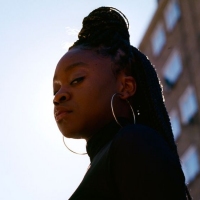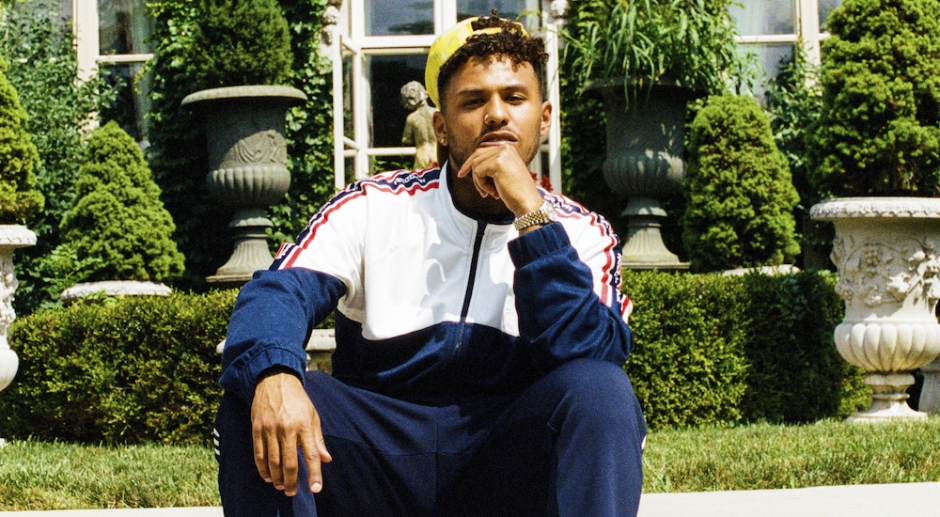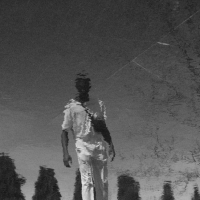 Sampa The Great makes magic on incredible new single, EnergyOne of Australia's best and most essential rappers continues to strive with a new single arriving ahead of festival shows across the summer.
Sampa The Great makes magic on incredible new single, EnergyOne of Australia's best and most essential rappers continues to strive with a new single arriving ahead of festival shows across the summer.

“You’re not gonna make everybody happy.” An interview with rap's rising star, Joey Purp
After a massive 2018, we catch up with the Chicago hip-hop force to talk QUARTERTHING, Kanye, the music industry and more.
“These are just things that I’ve accepted as greater than me.”
His city. His friends. His perspective. The things that make Joey Purp himself aren’t as much inexplicable as they are products of providence itself. It’s easy to see why Purp - born Joseph Davis - believes somebody is watching over him. Joey was in his early teens when something remarkable happened: inspired by the city’s rich musical history and the newfound utility of the internet, his entrepreneurial friends formed their own hip-hop collective. “We always wanted to be something,” he recalls. “We didn’t know what it was going to be, but we always knew we would be something.”
It wouldn’t take long for SAVEMONEY, so named for the virtue of self-sufficiency, to make its presence felt. While the Chi heaved with the bass-heavy eruption of drill, the members got to work on their own projects, enlisting producers and guests from within their roster. “Chance knew he was gonna be a famous rapper,” recalls Joey. “Vic knew he was gonna be a famous rapper.”
That they were. The ascension of Chance the Rapper and Vic Mensa to the forefront of the hip-hop scene helped revitalise a post-Kanye Chicago within the mainstream, and their hometown loyalties have furnished more than a few career-making guest spots - think Noname, Saba and Smino, and through them, artists such as Ravyn Lenae and Phoelix.
Despite the assured visions of his friends, young Joey was anything but set on his path. He’s the first to admit that if it weren’t for the ambitions of his peers, he probably wouldn’t even be an emcee. There’s a rare humility in ceding responsibility to something greater: while many a rapper lay claim to the power of their hustle and the future they themselves won, Joey’s more than willing to invoke the blessings with which he was graced. Nothing he could have done could have “made sure that [he grew] up with Peter [Cottontale], or that [he] knew Nico [Segal],” chance associations that have helped him discover his own propensity for heart-wrenching narratives and pithy distillations of institutional injustices. “That’s literally just universe right there, bro… I didn’t necessarily know I was gonna make music for a living,” he muses, “but now I’m trying to be as big and as impactful as I possibly can.”
QUARTERTHING, Purp’s debut album, is a testament to this ambition. Pairing the sweeping horn-laden bombast of 2016’s iiiDrops with minimalist party anthems, Purp splits his deft lyricism between the spoils of success and the trials of inner-city living.
Lead single Bag Talk juxtaposes a melancholy piano lick with trap-heavy hi-hats, while Elastic doubles down on the perky clap percussion that underpinned his biggest hit, 2016’s Girls @. Elsewhere, Joey revisits the grand horns of the iiiDrops era (Hallelujah), breaks ground on an unfamiliar, hypnotic flow (Fessional/Diamonds Dancing) and tries his hands at an aggressive autotuned banger (Karl Malone).
The sheer range of cadences, subjects and emotions throughout aren’t the only surprises. On QUARTERTHING, Joey managed to land verses from the founding fathers of the Wu-Tang, RZA and GZA: a fact all the more impressive when you consider his status as an independent artist. “You know, the RZA is like one of the reasons why I’m rapping, so I owe that man so much. Just for kinda Showing me the game as a youngin’, and just coming up to get that info, to get that insight, to get that level of excellence. Just something I’m always grateful for.”
Though both musically and generationally distinct, it makes perfect sense that Joey was raised on the Clan’s unsparing depictions of urban living. “I like to think of my music as hyperrealism,” he says, invoking visual art that depicts the oft-invisible details. “Maybe you identify with it, maybe it’s so foreign to you that it draws you to a different place that you don’t identify with, but it gives you insight in that way.”
Joey’s experiences, like the Wu’s before him, do run the risk of alienating audiences. It’s hardly their fault: the lives they’ve lived are dotted with the kinds of loss, hardship and adversity that few artists have yet experienced. At just 25 years old, Purp has already called quits on his drug dealing, seen the inside of a cell and watched his own brother contend with the possibility of a life behind bars. One particularly memorable Noisey documentary, released back in 2014, follows Vic as he scrounges up enough money to bail Joey out of jail. “He got bumped yesterday selling molly to a narc,” explains Mensa. “We gotta get my brother out of jail so that he doesn’t go to real jail.”
Joey’s recollections, however, aren’t doused in the romanticism of exotic martial art techniques. The only foils to the ever-present threat of death are fatherhood - itself anxiety-inducing - and the fun-yet-empty escapism of materialistic stunting. It’s a dichotomy best articulated on Godbody Pt. 2:
“I dream of Porsches and families that don't know divorces
Wake up to warring and niggas dying and buying Jordans…”
If the stark juxtaposition of the extreme against the mundane strikes you as sensationalist, know it’s anything but. “I just like to think of myself as imitating life,” adds Joey.

Given this commitment to spoken illustration, it comes as no surprise that words are Joey’s primary concern. His artistic mission revolves around more than just a sonic blueprint: it’s lyrical content with which he defines himself, a goal that’s just as much a statement as his carefully honed bars. “I never want to have a ‘sound,’” he begins. “I want my perspective to be a thing, I don’t wanna have a ‘type beat,’ I wanna have like a ‘type line.’” It’s a lofty goal: signature lyricism is the purview of all but the greatest emcees, something reserved almost exclusively for titans such as Jay Z, Ghostface Killah and Andre 3000.
It also helps explain the brevity that defines QUARTERTHING, on which all but four tracks run less than three minutes. “We just wanted to trim all the fat,” explains Purp. “I didn’t want to feel like I was adding bars just because there was more space before it got to a multiple of eight. I wanted to feel like I did everything I came to do.” The beats across the project never get the chance to ride out: on tracks such as Godbody Pt. 2 and Lebron James, Purp deliberately cuts himself off mid-bar, jumping from idea to idea with the agility of an emcee possessed.
“We felt like two-thirty to three minutes is the future of music. That’s how long people listen to songs: they want that bitch to slap, and they want you to say some raw shit over it… we tried to make sure all the production was dynamic.” It was a good bet. The song-as-vignette trend has taken off in 2018, perhaps best typified by Kanye West's Wyoming releases: those five projects were exceptional for their slim tracklists - seven songs apiece, bar Teyana Taylor’s KTSE - and fleeting individual runtimes. When I bring it up, Joey’s proud of the association. “We did it first,” he says, laughing. “We were already on our two to three-minute song shit! It’s all good; great minds think alike.”
Yet, on QUARTERTHING, Purp walks a delicate line. On the one hand, he’s earned nigh-universal acclaim for the versatile showing, yet on the other, he’s faced some stubborn resistance from fans with stringent expectations. It’s a pressure the emcee previously explored on iiiDrops cut When I’m Gone.
“I'm tired of fickle fans, don't understand my new direction
I'm sick of people too closed-minded to view progressions…”
Though he continues unabated, understanding that it’s an unavoidable facet of fandom, Joey’s in two minds about the restrictive gaze of expectations. “I mean, from [one] perspective, I feel like it doesn’t matter what people label me as, and then from another perspective, it’s like sometimes, if a certain person does a certain thing, it doesn’t really resonate the same way.”
“If Miley Cyrus or Taylor Swift made Slob On My Knob,” he starts, before pausing a moment. “That shit might go crazy, actually!” Still, the point stands: “you can’t really expect certain things from certain people.”
“If Three Six Mafia came out and made like… some Taylor Swift song that went triple platinum or whatever, they might not have been as successful, you know what I’m saying? Just based off preconceived notions about who these people are, and it could have been authentic to them and their life and shit.” It’s easy to see why this weighs on Joey’s mind. iiiDrops highlight Cornerstore found him teaming up with fellow Chicago up-and-comer Saba for a heart-wrenching depiction of growing up surrounded by violence. It’s simultaneously a fan favourite and a standout conscious effort in his catalogue, the kind of hit that eclipses his greater versatility. Luckily for us, that’s hardly enough to stop an artist of Purp’s tenacity. “I see a lot of support, obviously, but I see comments like ‘oh man, he needs to get back to doing what he really does!’ They’ll want me to rap on some boom-bap shit, and then other people will hear me rap and be ‘man, he just needs to make party songs, like Girls @, like, his rap stuff’s boring.’”
“You’re not gonna make everybody happy.”
Evolution, of course, is a key part of the rap game. It assures longevity, stokes interest and feeds the greater development of the craft. One of the reasons that it remains such an essential skill is because, like any art form, hip-hop itself is in flux. In the six years since his debut mixtape (“man, it’s been six years since The Purple Tape? What the fuck,” quips Joey. “That’s fucking crazy!”), both hip-hop and the greater music industry have changed dramatically. “It’s completely different, but it’s kinda the same,” he says, casting his mind back to 2012.
“Soulja Boy had already happened, so people were already getting rich off of YouTube, posting straight Youtube videos of themselves rapping in their crib. Chief Keef took off on YouTube and SoundCloud, so music is similar in that sense, but it’s like… so much more official.” The unconventional has seamlessly folded into the mainstream, rendering what were once exceptions as rules themselves. Soulja Boy’s come up was a novelty: not just for the music itself but also for the avenue by which he gained exposure. Now, eleven years after the fact, self-distribution is a viable way to break into the scene.
“The difference in the rap game, or the rap business,” says Joey, “can be seen in the microcosm of something like South by Southwest.” It’s a music and art convention with which Joey is intimately familiar: he made his SXSW debut back in 2016 and appeared again earlier this year. Even in that short timeframe, he sees a distinct change. “It used to be like the edgy, underground shit, it was super poppin’, all the up-and-coming artists would be there. There’d be some major shows that had sponsors, but it was only a couple of them. Now, everything has a sponsor, everything’s major, everything’s corporate.”
“You knew you weren’t gonna make no money when you come to South By,” he adds, seemingly recalling his first appearance. “You had to play like ten shows just to pay for your trip; nobody had budgets. Now, everybody getting paid for South By like it’s a festival.” Indeed, the acceleration of hip-hop into the mainstream has helped foster more opportunities for young artists. 2017 was the first year on record where R&B/hip-hop eclipsed pop as the United States’ most popular genre, a once-unprecedented achievement that’s largely thanks to streaming, the very system that once threatened to decimate the industry. That’s not lost on Joey.
“We used to hear all that stuff about how ‘record sales are dying’ and then ‘albums are dying’, and the ‘rap game is dying,’ but you don’t hear that stuff no more, because Lil Pump platinum, and A Boogie Wit A Hoodie platinum, Future platinum, and Drake platinum.” He’s impassioned as he finds more and more names, the potentiality clearly exciting him. “Chano, triple-platinum without even being registered in the RIAA.”
It’s hard not to get swept up in his optimism. In the last six years, Chance has pioneered independent artistry in the mainstream, inking a lucrative exclusivity deal with Apple while retaining total creative control. That deal alone netted him half a million dollars, and the mixtape in question - 2016’s Coloring Book - won him a Grammy. That wasn’t even possible back when the Chicago teens started.
Joey’s been finding similar successes as an independent artist. His breakout hit, Girls @, was used in a Gigi Hadid-starring Tommy Hilfiger spot back in 2017, an opportunity that gave him the chance to flex his own modelling chops. Even though he’s since received powerful cosigns from Wu-Tang and the coveted Best New Music accolade from Pitchfork, Joey’s still revelling over a May Instagram video showing Mick Jagger dancing to one of his songs.
“That was super crazy, man! Super crazy. Mick Jagger is Mick Jagger, bro!” It’s a big deal, especially given Joey’s love of rock and punk outfits: he often lists Sex Pistols and The Velvet Underground as amongst his chief influences. “It’s just crazy to think that my Mom was bumping Flowers when it came out in ‘67. That dude was dancing to my music! It gave me so much inspiration. I remember when I saw that video, and I watched it, and I screamed ‘anything is possible,’ because it really is.”
It’s inspiring stuff, and it’s meant to be. “We are trying to let people know it’s possible, you can come out here and do it,” he says. “You could go do it without a label, or you could go get a big bag from a label and be the biggest artist in the world, like Drake. You could really do whatever you want to out here!”

This is the spirit at the heart of Joey’s work, bridging both his art and the processes behind it. Even when he’s spurning grim narratives about the trials of youth, he’s celebrating the talents that helped him realise his wildest dreams. His ostentatious music videos and flex-heavy refrains double as narratives in themselves, a testament to the unwritten future. At age 14, Joey Davis had no idea he’d be an artist. He probably hadn’t even considered that an article such as this would ever warrant writing, and yet as we speak, he glides through the conversation, charisma catching, enthusiasm contagious. Even as this new world unfolds at his feet, there’s no time to stop: luckily for Joey; he’s always a few steps ahead.
“We’re already in the process of making it, but we’re gonna make a TV show. We’re gonna make more visual stuff. I’mma do more work with other artists, I’m gonna step into production, and I’m gonna try and get into a movie next year. That’s my list of things I’m trying to do.”
It’s clear that there’s no single form to which Joey’s wed: he’s a jack of all trades and, as of QUARTERTHING, a master of one. The philosophy underpinning his music - type lines, not type beats - applies across the entire artistic spectrum: no matter the mode, Joey’s set on bringing his unique perspective to the world. He sees this outlook as the cornerstone of his vision, the hallmark that helps distinguish him from his contemporaries. When I ask what’s next, he hits back with a simple response: “more art, man.” It’s a phrase as vague as it is promising.
As for the SAVEMONEY crew?
“This is just the start. We gon’ be way bigger.”
Follow Joey Purp: FACEBOOK
 Sampa The Great makes magic on incredible new single, EnergyOne of Australia's best and most essential rappers continues to strive with a new single arriving ahead of festival shows across the summer.
Sampa The Great makes magic on incredible new single, EnergyOne of Australia's best and most essential rappers continues to strive with a new single arriving ahead of festival shows across the summer.
 Meet quami.xyz, the Toronto musician mixing guitar with hip-hop on ClementineTaken from his debut project Et Cetera, Clementine is the perfect introduction to the Toronto musician's sound.
Meet quami.xyz, the Toronto musician mixing guitar with hip-hop on ClementineTaken from his debut project Et Cetera, Clementine is the perfect introduction to the Toronto musician's sound.